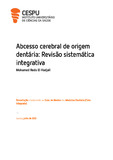| dc.contributor.advisor | COELHO, CRISTINA MARIA LEAL MOREIRA | |
| dc.contributor.author | Hadjali, Mohamed Reda El | |
| dc.date.accessioned | 2023-11-23T10:26:18Z | |
| dc.date.available | 2023-11-23T10:26:18Z | |
| dc.date.issued | 2023 | |
| dc.identifier.uri | http://hdl.handle.net/20.500.11816/4413 | |
| dc.description.abstract | Introdução: O abcesso cerebral é uma grave infeção que resulta na formação de pus e afeta o tecido cerebral, podendo levar a danos permanentes e morte. Esta condição pode ser causada por bactérias, fungos e outros microrganismos, sendo importante ressaltar que aproximadamente 25% dos casos têm origem em infeções orais.
Objetivo: Identificar quais as bactérias que causam mais frequentemente abcessos cerebrais de origem dentária. Compreender como é que as bactérias chegam ao cérebro a partir da cavidade oral. Aprender a gerir e a tratar o doente para minimizar o risco de infeção.
Materiais e métodos: Foi realizada uma pesquisa bibliográfica na base de dados PubMed, LILACS e ScienceDirect usando as palavras-chave: “Dental Focal Infection” AND “Brain Abscess”.
Resultados: Através da análise de catorze artigos, foi possível identificar tanto os microrganismos associados à infeção, quanto os métodos de diagnóstico e tratamento.
Discussão: A deteção precoce de sintomas e identificação de infeção bacteriana de abcesso cerebral é crucial para um tratamento eficaz. O tratamento envolve intervenções cirúrgicas e terapia antimicrobiana.
Conclusão: Os Streptococcus do grupo viridans, em especial a espécie Streptococcus intermedius são os principais responsáveis pela ocorrência de abcessos cerebrais, sendo que as bactérias anaeróbias correspondem a 78% dos casos. Estas bactérias podem alcançar o cérebro através de disseminação contígua, bem como por via sanguínea ou linfática, embora estas últimas sejam menos comuns. A avaliação dos sintomas clínicos, a identificação de um foco infecioso dentário e outros fatores predisponentes, são elementos essenciais para o tratamento e para reduzir o risco de infeção. | pt_PT |
| dc.description.abstract | Introduction: Brain abscess is a serious infection that results in the formation of pus and affects the brain tissue, which can lead to permanent damage and death. Bacteria, fungi, and other microorganisms can cause this condition, and it is important to note that approximately 25% of cases originate from oral infections.
Objective: To identify which bacteria most frequently cause brain abscesses of dental origin. Understand how bacteria get to the brain from the oral cavity. Learn to manage and treat the patient to minimize the risk of infection.
Materials and methods: A bibliographic search was performed in PubMed, LILACS and ScienceDirect databases using the keywords: “Dental Focal Infection” AND “Brain Abscess.”
Results: Through the analysis of fourteen articles, it was possible to identify both the microorganisms associated with the infection and the methods of diagnosis and treatment.
Results: Through the analysis of fourteen articles, it was possible to identify both the microorganisms associated with the infection and the methods of diagnosis and treatment.
Discussion: Early detection of symptoms and identification of bacterial brain abscess infection is crucial for effective treatment. Treatment involves surgical interventions and antimicrobial therapy.
Conclusion: Streptococcus of the viridans group, especially the species Streptococcus intermedius, are the main responsible for the occurrence of brain abscesses, with anaerobic bacteria accounting for 78% of cases. These bacteria can reach the brain through contiguous spread, as well as via blood or lymphatics, although the latter are less common. The evaluation of the clinical symptoms, the identification of a dental infectious focus and other predisposing factors are essential elements for the treatment and to reduce the risk of infection. | pt_PT |
| dc.language.iso | por | pt_PT |
| dc.rights | info:eu-repo/semantics/openAccess | pt_PT |
| dc.subject | Dental Focal Infection | pt_PT |
| dc.subject | Brain Abscess | pt_PT |
| dc.title | Abcesso cerebral de origem dentária: Revisão sistemática integrativa | pt_PT |
| dc.type | info:eu-repo/semantics/masterThesis | pt_PT |
| dc.identifier.tid | 203362322 | pt_PT |
| thesis.degree.name | Mestrado em Medicina Dentária | pt_PT |

